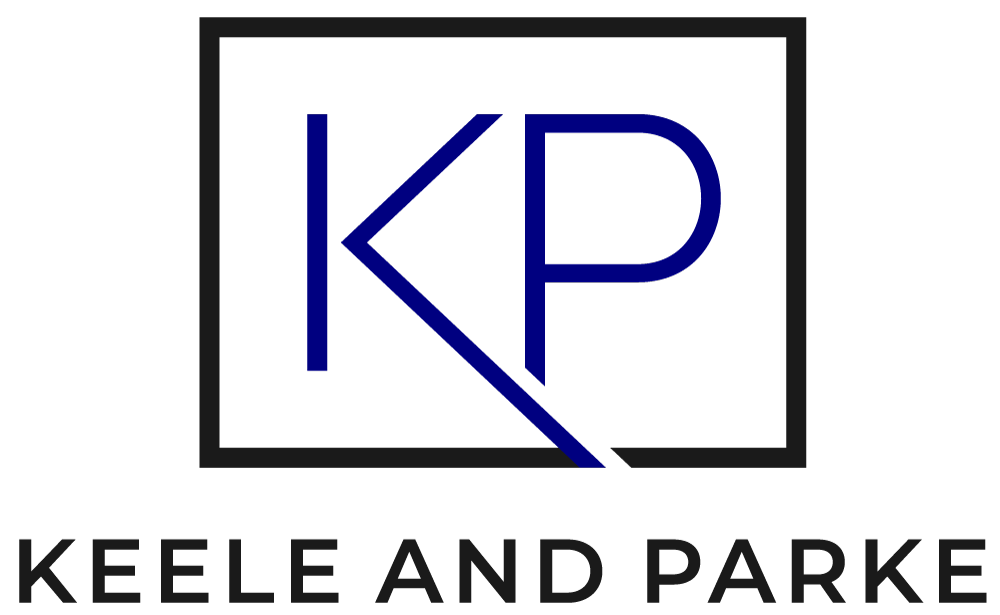Should you organize your business as an LLC, a corporation, a partnership, or a sole proprietorship? What are the differences between each corporation type? Under the laws of which state should you form your business? Making the wrong decision about these fundamental questions could sink your business before you even get started. Having competent guidance will ensure that your decisions match your long-term goals.
Starting Your Business
Starting a business is an exciting and intimidating endeavor, but not one to be completed alone. At Keele & Parke, clients benefit from counsel that is informed by decades of firsthand experience in business. Our expertise in business formation and operation coupled with the obvious advantages of legal counsel is here to help you in each step along the way.
Our goal is to ensure that your business is set up for long-term success while minimizing legal risks and liabilities. Business law is complicated, and having counsel versed in the world of business could be the difference between success and failure. At Keele & Parke, clients are granted access to the knowledge and experience of world-class business leaders who are here to serve you and your business needs.
The owners of some types of businesses are granted special liability protection from the government. Thus, shareholders in a corporation, members of an LLC, and limited partners in a partnership are not subject to liability for the debts and lawsuits of the business. Unless specific filings are made with the government, the owners may be fully liable. Even with the special liability protection granted by the state, however, owners are still liable for their personal actions that fall outside of the scope of the business.
What documents will you need to open a bank account for your business? Should you establish a line of credit with your bank? If so, how will you know what terms you should negotiate?
Corporate Formality Requirements:
How do you protect your personal assets from the creditors of your business? Even with the limited liability protection granted by the state, if your business is not operated with the appropriate legal formalities, creditors and those who file lawsuits can persuade a court to disregard your business and seize your personal assets, including your personal bank accounts, your home, your vehicles, etc. Understanding the legal formalities of running a business can give you peace of mind.
There are important considerations to make before hiring employees or retaining independent contractors. Some federal and state employment laws only apply to certain types or sizes of businesses. Additionally, establishing correct payroll procedures can ensure that the IRS doesn’t come knocking at your door.
What contracts will you need to run your business? Will you be signing contracts with vendors or suppliers? Do you have trade secrets you want to protect?
Do your ideas need to be protected via copyright, patent, or trademark? How can you protect others from stealing or infringing on your ideas and hard work? How do employee confidentiality agreements play into this equation?
How will you get the capital to invest and run your business? The federal and state governments have put in place stringent requirements that must be followed when raising capital. Even slight misstatements or omissions can lead to big challenges. How will you document the investments of others: will it be debt, or will you give them an ownership interest?
The most common reason businesses fail is an inability to manage cash flow. They simply run out of money. Paradoxically, this frequently happens with growing and prospering businesses, as they run out of the cash necessary to fund their growth. Simple things like negotiating the payment terms in your customer or supplier agreements have monumental consequences.
Many government regulations apply only in specific circumstances. Do you need to worry about regulations from the alphabet soup of government agencies (e.g., SEC, IRS, EPA, FDA, FAA, DOD, etc.)?
How will your business be taxed? When and how do you pay your taxes? One of the scariest parts of running a business is the concept of phantom income, where a person can actually owe more in taxes than the money they get out of their business. Understanding these issues in advance can be the difference between success and failure.

Limited Liability Companies (LLCs)
A limited liability company, commonly called an LLC, is the most flexible way to operate a business. At Keele & Parke, our experience allows us to find the best business solution to turn your dreams into a thriving reality. A well-organized LLC may offer you the flexibility and protection you need.
How does an LLC work?
Each state has its own statute that governs the creation and operation of LLCs, but there are many commonalities. The owners of an LLC are typically called ‘members’ instead of ‘shareholders’. An LLC can either be managed by a member or group of members, or by an appointed manager. This is specified in the operating agreement of any LLC, which is the equivalent of the bylaws of a corporation. Some important decisions should be made in advance, and can be included in this agreement. LLCs are typically taxed as partnerships, which means that the entity itself does not pay income taxes – all income taxes are paid by the members of the LLC. The LLC may need to pay other types of taxes, including property taxes, sales taxes, use taxes, etc.
There are fewer corporate formalities associated with running an LLC, however, the members must still exercise due care to ensure that the limited-liability shield given by the state protects their personal assets. In some circumstances, it makes sense to file an election to have your LLC taxed as an S corporation, but this comes at the cost of flexibility.
Corporations (S, C, & B)
Deciding which type of entity is right for your business goals is a difficult decision, and the insights offered at Keele & Parke will provide you with the confidence you need to move forward with your vision. Our clients are served by the experience of successful business operators and founders throughout the entity selection process. Corporations are divided into several categories, each governed respectively by individual states. Corporation types differ primarily in tax and ownership regulations.
C Corporations:
The defining attribute of a C corporation is the requirement to pay both entity-level taxes (determined based on the corporation’s earnings) as well as taxes upon dividends. This means that when shareholders are paid out, that money is taxed. While two tax rates may seem suboptimal, a C corporation offers flexibility and access to capital that other corporation types cannot. Versatile stock trading makes this the standard corporation type for publicly traded businesses.
S Corporations:
Entity-level taxes can be avoided through the use of an S corporation, with all taxes being applied directly to owners’ income. This corporation type does not come without disadvantages either, however. The IRS imposes limitations upon the number and types of owners, and the treatment thereof. An LLC offers similar benefits while sustaining flexibility, though LLCs are impermanent, meaning that they dissolve upon the death of the owner(s).
B Corporations:
A B corporation is uniquely defined not by tax processes or ownership, but by its ability to pursue social goals set forth in the company’s organization. Liability is decreased as a B corporation fulfills its purpose.
Corporate law is intentionally complicated. Businesses founded under the counsel of Keele & Parke are marked by synergy in the real world, designed with full attention to each intricacy of the law.
Partnerships
When it comes to establishing partnerships, navigating the legal complexities is crucial for a successful and harmonious business venture. At Keele & Parke, we offer expert counsel and guidance for those starting businesses. Our combined experience will assure you in understanding the nuances of various partnership structures and help you choose the one that best suits your needs and goals.
General Partnership:
A general partnership is any two or more people who have decided to form a business together, even before filing with the government. Each partner shares equal responsibility for the partnership's debts, liabilities, and decision-making. This type of partnership does not provide personal liability protection.
Limited Partnership:
Limited partnerships involve two types of partners: general partners and limited partners. General partners enjoy managerial control. However, they are unprotected from liability, while the liability of limited partners is restricted to their investment in the partnership. Limited partners also hold less power in the corporation.
Limited Liability Partnership (LLP):
This type of partnership offers equal liability protection to all partners. An LLP allows partners to be shielded from personal liability for the actions and debts of other partners, as well as from the creditors and lawsuits of the business.
Limited Liability Limited Partnership (LLLP):
This partnership type is similar to a limited partnership (NOT to an LLP), except both general and limited partners are exempt from liability, dependent upon the correct filings being made.
It is important to note that partnerships are not taxpaying entities; all income and attached taxes are directed to each partner.
Our clients feel supported through the entire partnership formation process. At Keele & Parke, ensuring compliance with legal requirements, drafting partnership agreements, and addressing key issues such as profit sharing, decision-making authority, and dispute resolution mechanisms is made straightforward and stress-free. By seeking our counsel, you can establish a partnership structure that aligns with your goals while safeguarding your interests and minimizing legal risks.
Contracts & Agreements

Good Business
At Keele & Parke, we believe in community. Which is why we believe in good business. Our intention is to equip each of our clients with the tools and strategies necessary to make their dreams real in a way that benefits not only them, their employees and clients, but also to the public. As the saying goes, good fences make good neighbors, and the right legal agreements will sustain congruousness so that you can focus on your business.

Negotiating
Negotiating contracts can be inordinately complicated and confrontational without first understanding how your interests translate into practice. Our counsel will prepare you to negotiate with grace, build and maintain a healthy presence in your community and workplace, and define your interests and priorities.
Contracts & Agreements

Good Business
At Keele & Parke, we believe in community. Which is why we believe in good business. Our intention is to equip each of our clients with the tools and strategies necessary to make their dreams real in a way that benefits not only them, their employees and clients, but also to the public. As the saying goes, good fences make good neighbors, and the right legal agreements will sustain congruousness so that you can focus on your business.

Negotiating
Negotiating contracts can be inordinately complicated and confrontational without first understanding how your interests translate into practice. Our counsel will prepare you to negotiate with grace, build and maintain a healthy presence in your community and workplace, and define your interests and priorities.

Mergers & Acquisitions
From its inception to its dissolution, owners invest their blood, sweat, and tears into their business. The decision to sell a business, or to merge with another business, can be emotional and complicated. Once that decision is made, however, it is important to make it happen the right way. The same applies to buying a business.
Even apparently simple decisions in a merger or acquisition can hold significant tax implications that may affect your financial bottom line. Our clients enjoy counsel on these crucial decisions that is enlightened by decades of real-life experience in the corporate realm.
Determining whether to sell the assets or stock of a business, setting aside funds for future liabilities, and even choosing the payment method for the purchase (cash, future earnings, or stock) are complex considerations that require the expertise of experienced professionals. Relying solely on yourself or your accountant to navigate these decisions can expose you to unnecessary risks.
